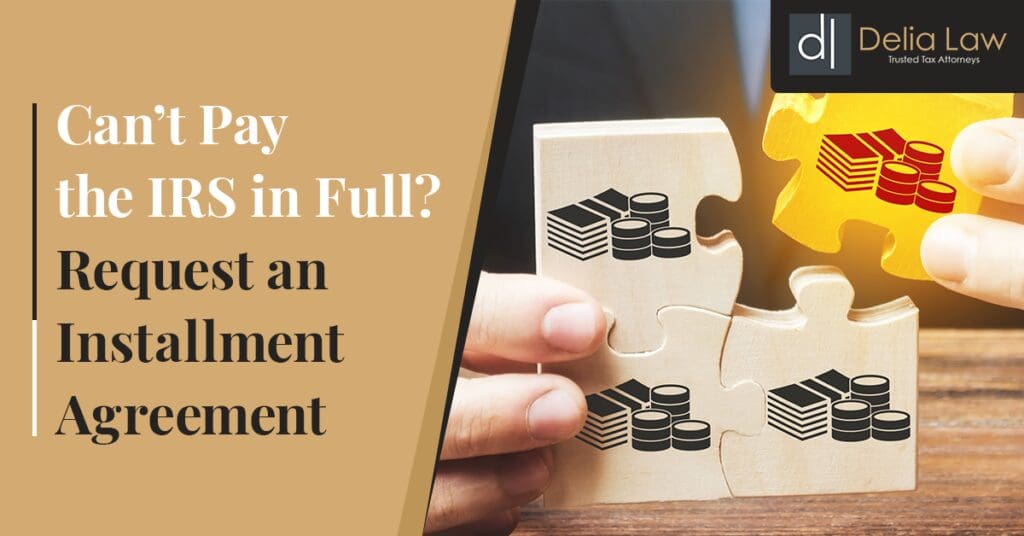Many taxpayers find themselves in a difficult situation – they owe money to the IRS, but they don’t have the money to pay their balance upfront.
Fortunately, the IRS offers a solution if you can’t pay them in full: a payment plan, or an installment agreement.
According to the IRS, nearly 2.4 million new installment agreements were established in 2021. These agreements allow you to pay your balance over time, but it’s important to understand how they work, what fees you’ll have to pay and what happens if you don’t make your payments.
What is an IRS Installment Agreement?
An installment agreement is a type of payment plan with the IRS. It allows you to make monthly payments to satisfy your debt.
If you owe money to the IRS and you can’t make your payment in full, a payment plan may be your best option. Failing to pay your taxes or to request a payment plan can have serious consequences.
- The IRS can file a federal tax lien on your property.
- The IRS can actually take your property, through a levy, to satisfy your debt.
The IRS has made it easy to request installment agreements online, over the phone or by mail. A tax attorney can also help with this process if you don’t want to deal with the IRS yourself.
The IRS isn’t typically concerned about the size of the monthly payment as long as the bill is paid in full within six years. In fact, they even offer multiple types of agreements.
Types of Installment Agreements
If you owe $25,000 or less to the IRS, you may qualify for one of the following installment agreements.
Streamlined Installment Agreement
Most taxpayers that owe less than $25,000 will qualify for the streamlined agreement. This agreement has few qualifications outside of your tax liability amount. Again, your proposed monthly payment must satisfy the debt within 72 months or by the Collection Statute Expiration Date (CSED).
Streamlined agreements are for:
- Individuals
- Out-of-business taxpayers
- In-business taxpayers with income tax only
Individuals and out-of-business sole proprietors with a tax liability of $25,000-$50,000 may qualify for this installment agreement if they agree to pay via payroll deduction or direct debit.
Guaranteed Installment Agreement
Taxpayers with less than $10,000 in tax liability may qualify for a guaranteed installment agreement if they meet the following requirements:
- Over the last five years, all income tax returns have been filed on time, any owed taxes have been paid in full and they haven’t entered into an installment agreement for income tax payments.
- They are financially unable to pay the full liability when due.
- They agree to pay their entire balance within three years and comply with all tax laws during this time period.
In-Business Trust Fund Express Installment Agreement
If you are an in-business taxpayer, you may qualify for this agreement if:
- Your tax liability is $25,000 or less
- You agree to pay via direct deposit if you owe $10,000-$25,000
- Your proposed monthly payment will satisfy the debt within 24 months or by the CSED.
One advantage of these agreements is that they are designed for streamlined processes and don’t require you to share any information about your finances.
If you do not qualify for these particular payment plans, you may still be eligible for an installment agreement. However, the following items may be required:
- A collection information statement, IRS Form 433A
- Notice of Federal Tax Lien determination
Short-Term Payment Plan
Along with installment agreements, the IRS also offers a short-term payment plan option. However, this agreement will only give you an additional 180 days to pay your tax liability in full.
One advantage of this plan, if you can make it work, is that it doesn’t include any fees. You will, however, have to pay interest and penalties, so keep that in mind.
Does an IRS Payment Plan Have Costs or Fees?
Yes, there are costs and fees associated with installment agreements. The fees you are charged will depend on a number of factors. Here are some of the costs and fees of installment agreements:
If You Agree to Pay Via Direct Debit (Automatic Monthly Payments)
- Application and setup: $31 online; $107 for in-person, mail or phone setup
- Accrued failure to pay penalties and interest until the liability is paid in full
If you qualify as a low-income taxpayer, the setup fee may be waived.
If You Make Payments Via Other Payment Options
- Application and setup: $130 online; $225 for in-person, mail or phone setup
- Accrued penalties and interest until the liability is paid in full
If you qualify as a low-income taxpayer, the setup fee may be waived.
What Happens if You Can’t Pay Your Installment Agreement Monthly Payment?
Unfortunately, there are times when you can’t afford to make installment payments. In this scenario, you may enter into what is known as a “temporary delay of collection.”
If making a payment would stop you from paying for your basic living expenses, you can request a delay in the collection of your debt.
The IRS will need you to:
- Fill out a Collection Information Statement (433A)
- Provide proof of your current financial status
If the payment is delayed, the debt will still accrue interest and penalties. You may also have a Notice of Federal Tax Lien filed. The lien is a way for the government to alert creditors that they have a claim on your assets.
The IRS wants you to pay your debt, so they’re often willing to work with you to come to some form of an agreement on the taxes that you owe. However, the more time that you ask for to repay the debt, the more information the IRS will ask you to provide.
Missing an installment agreement payment will result in a Notice of Intent to Terminate Your Installment Agreement.
You can file an appeal to this notice within 60 days of receiving it.
If you are up-to-date with filing your taxes and simply cannot pay your back taxes or coming taxes due, an offer in compromise may be an option for you. An offer in compromise allows you to settle your debt for less, but there are stringent requirements in place.
The key for anyone unable to pay their taxes is to keep an open line of communication with the IRS. An experienced and skilled tax attorney can (1) negotiate on your behalf (2) protect you against IRS collections (3) can save you a lot of money and (4) allow you to sleep at night knowing you are in good hands.
Can’t pay your taxes and don’t want to deal with the IRS on your own?
Contact Delia Law today to learn how we can help you overcome scary IRS tax collections.










